Reestablish U.S. Role as an Effective Process Orchestrator
Advance an Inclusive Approach
Symbolic recognition of attachment to the land
An early step to demonstrate American attentiveness to both national and religious worldviews, as well as inclusiveness toward all relevant constituencies, is an acknowledgement of the distinct attachments to the entirety of the land, including Jerusalem, of the two peoples – Jewish-Israelis and Arab-Palestinians – and the three religions – Judaism, Islam and Christianity – and promoting such recognition in relevant international and regional institutions.
Reset U.S. Relationship with the Palestinians
Objective
Reset the U.S.-Palestinian relationship so that the United States can play an effective orchestrator role in the eyes of Palestinians.
To restart a positive dialogue with the Palestinians, the U.S. administration should unequivocally state that U.S. policy is anchored in a vision of two nation states-Israel and a new Palestinian state-living side by side in peace and security. The U.S. should also initially outline its plan to lead an inclusive approach and take steps with the parties designed to simultaneously improve lives, narrow the conflict and build a two-state reality.
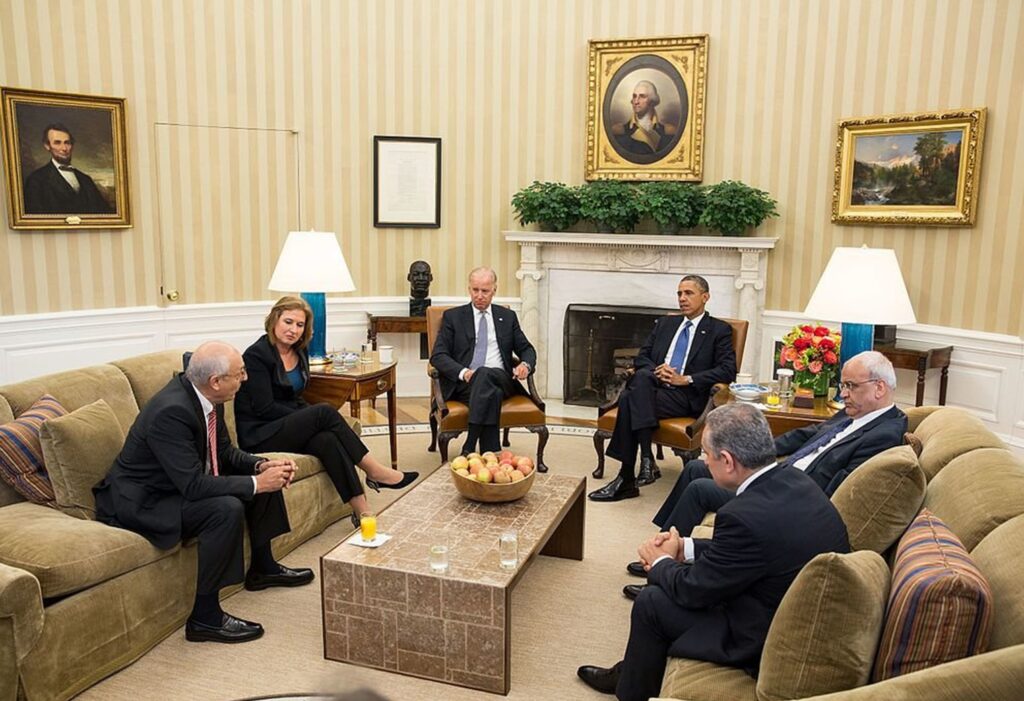
Oval Office meeting with President Obama and Vice President Biden with Israeli and Palestinian negotiators (Chuck Kennedy, 2013)
Effective diplomacy requires that the U.S. be viewed as a reliable and credible interlocutor, with open channels to leaders and publics on both sides. The U.S. has a special relationship with Israel, which is unquestioned and understood by all parties. In fact, it is Washington’s unique alliance with Israel that is a principle reason why Palestinian and Arab leaders have long looked to the U.S. as an indispensable mediator.

U.S. Consulate General in East Jerusalem (Ariel Schalit/AP, 2019)
This is why the Trump administration’s decision to close the PLO office in Washington in 2018, and the closing of the U.S. Consulate and transferring of its functions to the Embassy, have been counterproductive. It is not altogether clear that Israeli officials even advocated for these measures. Reestablishing reliable and official channels to Palestinian leaders and Palestinian society will enable the U.S. to once again play the leading role in encouraging Israeli-Palestinian engagement and will prevent actors less favorable to Israel from filling the leadership vacuum.
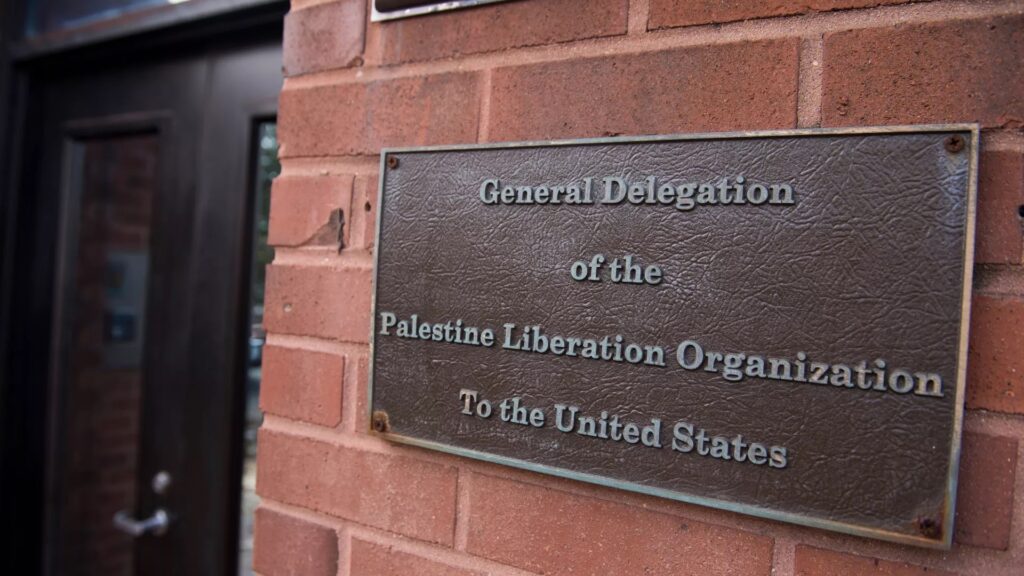
Office of the General Delegation of the PLO to the U.S. in Washington, DC (Saul Loeb/AFP/Getty Images, 2018)
President Trump’s December 2017 announcement that recognized Jerusalem as Israel’s capital and set forth the move of the U.S. Embassy should be maintained. Still, Trump’s policy did not foreclose the possibility of a compromise or explicitly deny that there are legitimate Palestinian claims. The United States does not take “a position” on any of the “final status issues,” Trump said, “including the specific boundaries of Israeli sovereignty in Jerusalem, or the resolution of contested borders. These questions are up to the parties involved.” Indeed, the Trump administration’s “Peace to Prosperity” plan designates to the Palestinian state areas within the Israeli defined municipal boundaries of Jerusalem.
Even so, the absence of any clear signal by the U.S. about Palestinian claims, combined with the defunding of U.S. assistance programs that benefitted Palestinians in East Jerusalem, have contributed to a growing perception amongst Palestinians that the U.S. is actively seeking to undermine and delegitimize Palestinian claims, despite the reality that more than a third of the city’s population is Palestinian. By acknowledging that Palestinians also have legitimate claims in East Jerusalem, including its historic core, the U.S. can restore trust and build confidence in our role as a process orchestrator, without compromising Jerusalem’s status as the capital of Israel.
The United States should return to its principled position opposing unilateral actions by either side that undermine prospects for two states practiced by successive Republican and Democratic administrations. In return for resetting the relationship along the lines outlined above, the U.S. should expect a “U.N. truce” from the PLO—not unlike the arrangement Secretary of State Kerry brokered in 2013-14—and ask that Palestinians refrain from further efforts to expand membership at the U.N., its agencies or at the ICC. Absent this Palestinian commitment, reopening the PLO’s Mission in Washington would be next to impossible given standing U.S. law.
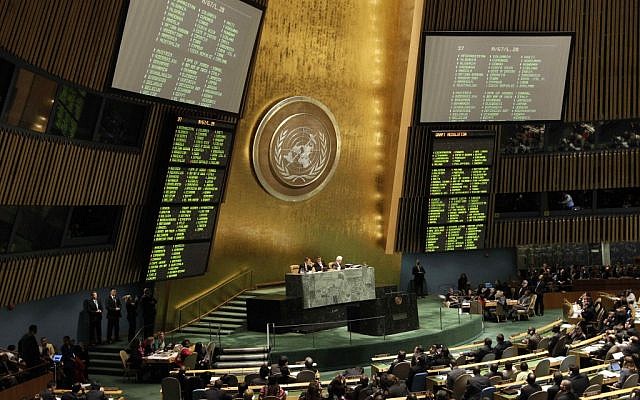
UN General Assembly votes on Palestinian statehood (Kathy Willens/AP, 2012)
Reaffirm U.S. Commitment to Israel’s Security
Objective
Reassure Israel that any readjustment of U.S. positions toward the Palestinians will be consistent with Israeli security and diplomatic interests and a two- state vision, whereby Israel remains Jewish and democratic. More so, that following the UAE, Bahrain, Sudan and Morocco normalization agreements with Israel, the U.S. is committed to enhancing and upgrading Israeli relations with additional Arab states and the international community, as well as recognition of Jewish history and Israel’s Jewish and democratic character by Palestinians, Arabs and the international community, consistent with a two-state vision.
Since the 1960s, American presidents have made commitments to Israel’s security, including the notion of maintaining Israel’s “Qualitative Military Edge” (QME), a core pillar of Israel’s national security strategy that allows the Jewish state to defend itself despite its adversaries’ advantages in size, population and resources. The concept of QME, which initially grew out of U.S. peacemaking efforts and American assurances as Israel took risks for peace, is also enshrined in U.S. law.
American security commitments are critical to reassuring Israelis, particularly in a context where they are being asked to take steps toward Palestinians. The U.S. guarantee about QME has been stressed by the Trump administration’s promises of advanced weapon systems tied to the UAE normalization agreement, which has made reaffirming this principle all the more important.
In addition to QME, it will be important to acknowledge the Jewish state’s long-term security needs in the strategically important Jordan Valley, both in ways that are meaningful to Israelis but do not undermine the potential for a future Palestinian state.

Former U.S. Ambassador Dan Shapiro delivers F-35 jets to Israel (Max Falkner/Star-Telegram, 2016)
No Israeli leader can address the Palestinian issue in isolation from the country’s broader threat matrix. In this regard, Iran continues to loom large. Israelis are understandably concerned about Iran’s malign activities across the region, including Tehran’s support for terrorist groups that threaten Israel. Whether it be confronting Hezbollah in Lebanon, or Hamas in Gaza, Israel is on the front-line of Iran’s support for terrorism.
Reaffirming the overall U.S. commitment to confront Iran, and, in particular, linking the denuclearization track to Tehran’s support for terrorism and its ballistic missile program, as well as reauthorizing the U.N. arms embargo against Iran, would reassure Israeli leaders and send a powerful signal of support and solidarity to the Israeli public and our regional allies.
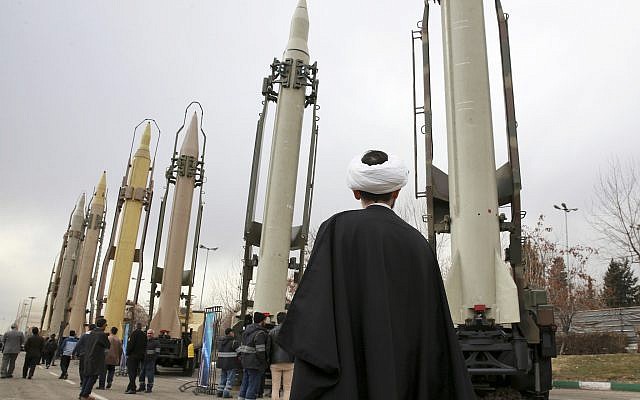
Domestically built surface to surface missiles displayed by the Revolutionary Guard in a military show marking the 40th anniversary of the Islamic Revolution (Vahid Salemi/AP, 2019)
Although the U.S. officially opened an embassy in Jerusalem in 2018, few other countries have followed suit. In fact, quite the opposite. Trump’s policies led many countries to double-down on maintaining a diplomatic footprint outside Jerusalem. By choreographing a series of positive steps by all parties, the U.S. can generate a political dynamic that enables the recognition of Jerusalem as Israel’s capital to broaden and deepen across the international community. Jerusalem is both a practical and symbolic issue for many Israelis and the more the U.S. can do to affirm the city’s standing as Israel’s capital, the more Israelis will feel secure to take measures that improve conditions for Palestinians and narrow political differences with the Palestinian Authority.
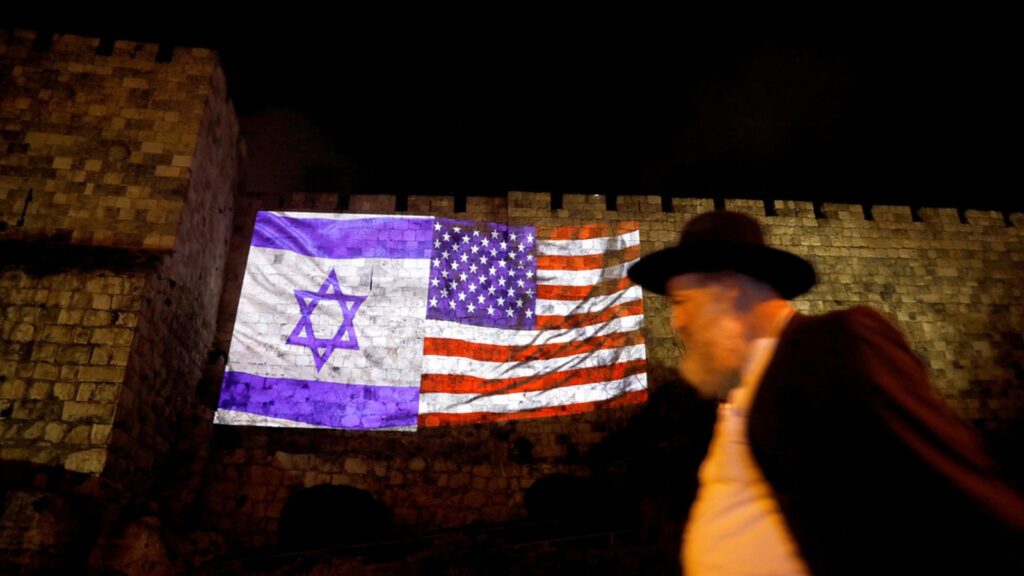
Israeli and American flags are projected on the walls surrounding Jerusalem’s Old City (Ronen Zvulun/Reuters, 2017)
Regional Track: Religious Peacebuilding
An essential element of an inclusive regional strategy missing from previous diplomatic initiatives is American engagement with religious Arab and Muslim actors and – separately – with Jewish religious actors, inside and outside Israel, in order to orchestrate symbolic gestures between recognized religious figures. Religious peacebuilding can be accomplished by engaging prominent Islamic and Christian authorities and institutions,1 For example, al-Azhar University, Morocco’s Ulema, the Muslim Elders Council (Abu-Dhabi based), KAICIID (Saudi Arabia, Austria, Spain; Vienna-based), the Muslim World League (Mecca-based); as well as the International Union of Muslim Scholars (Doha-based), the European Council for Muslim Research (Dublin-based) and the Directorate for Religious Affairs [Diyanet] (state-controlled, Ankara-based). as well as prominent Jewish authorities and institutions,2 For example, Israel’s Chief Rabbinate, senior most Haredi rabbinic authorities (e.g. Rabbis Kanievski, Edelstein, Yosef and Mazuz), prominent religious Zionist rabbinic organizations (e.g. Derech Emunah, Community Rabbis, Hotam, Tzohar, Beit Hillel), prominent religious Zionist Yeshivas (e.g. Merkaz Harav, Har Hamor). in the Palestinian Territories, Israel and throughout the Middle East.
Such cross-worldview interactions3 In the case of religious constituencies, peacebuilding requires discreet meetings between religious leaders, and differs from normalization, which requires state-to-state recognition and large-scale people-to-people activities (business, culture, etc). should aim to achieve three ambitious goals:
- First, educate religious constituencies about different religious perspectives regarding the possibility of more peaceful relations and build trust between them emphasizing religious themes, rather than political.
- Second, reframe prohibitions that have defined and fueled the Israeli- Palestinian conflict for decades and shaped widely held narratives (for example, prohibition of foreign sovereignty in the Holy Land) [see Track 2B].
- Third, create a dynamic that is less adverse and more receptive to diplomatic initiatives within observant Israeli and Palestinian religious communities to enable greater latitude for political leaders on both sides.